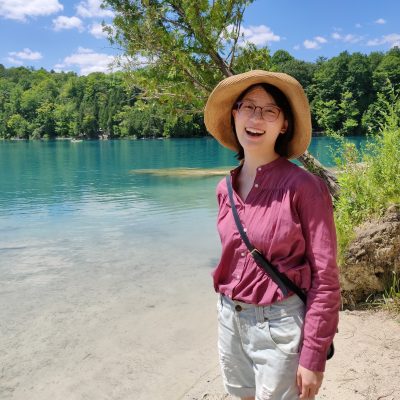Student Spotlight: Hui Ji

February 21, 2022
Hui Ji is a doctoral candidate in genetics, genomics, and development from Jingzhou, Hubei, China. After attending Zhiyuan College, Shanghai Jiao Tong University in Shanghai, China, she chose to pursue further study at Cornell after visiting for summer research during undergraduate study and learning more about the university’s history and community. Hui Ji is a recipient of a 2022 Wu Scholarship.
What is your area of research and why is it important?
My research interests lie in the fundamental question of how neurons degenerate (i.e., how neurons break down and lose their functions). This pathology is a characteristic of neurodegenerative diseases. Different from studies focusing on factors in neurons, my studies are among the first few that uncover how environmental factors lead to degeneration. For a long time, cells surrounding degenerating neurons were thought to clear the broken neuronal debris passively. My studies discovered that surrounding cells actively tear apart intact neuronal branches when an “eat-me” signal is detected on the neuronal surface.
What are the larger implications of this research and what is its impact?
The fact that surrounding cells engulf degenerating neurons plays an important role in the health and development of our nervous system. First, abnormal clearance of neurons has implications in neurodegenerative diseases, such as Alzheimer’s disease and Parkinson’s disease. Second, broken neuronal branches due to injury need to be cleared efficiently to make room for the neurons to regrow. Third, many neuronal branches have gone through programmed pruning to function properly since our childhood. Clearance of pruned branches is essential for the fine-tuning of the nervous system. Last, failure of clearing the degenerating neurons leads to inflammation and secondary damage to the nervous system.
What does it mean to you to have received the Hsien and Daisy Yen Wu Scholarship?
I was thrilled to learn of my selection for this honor! I am grateful for being recognized, and this award will greatly encourage me as I am on my way to advancing my career as a researcher to the next level. I would also like to thank my advisor, my research committee members, and my peers in graduate school. I could not have achieved this without them.
What will this award allow you to do that you might not have been able to otherwise?
The scholarship will enable me to attend conferences outside of my immediate research field and allow me to explore future research topics that I would like to pursue during my postdoctoral training. I am interested in attending conferences in the fields of neural circuits and phagocytes, where I can meet the leaders in the fields and present my work to a broader community. I am also interested in using the fund to gain experience in machine learning to tackle some of the imaging analysis challenges in my research.
What are your hobbies or interests outside of your research or scholarship?
I am a dressmaker when I am not in the lab. When my friends passed around the Vogue magazine in my high school classroom, I could not stop imagining how the fabrics were cut and sewed into beautiful garments. The character “Little J.” in the Gossip Girl show inspired me that I do not have to get a degree in fashion design to be a dressmaker. After getting a nice sewing machine with my savings in graduate school, I started making dresses, pajamas, and plushies for my friends and family.
Why did you choose Cornell to pursue your degree?
Before I decided to apply for graduate schools, I felt connected to Cornell when my parents told me the story of how the CUSBEA program created by Professor Ray Wu at Cornell helped thousands of Chinese students pursue graduate studies in the U.S. During my undergraduate study, I visited Cornell for summer research. I immediately fell in love with this beautiful campus. The more I knew about Cornell, the more I found out the strong community of biological research and welcoming environment would make Cornell my ideal second home.
